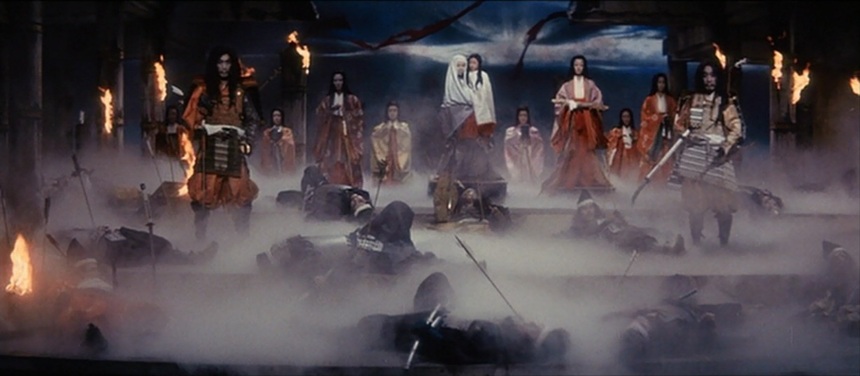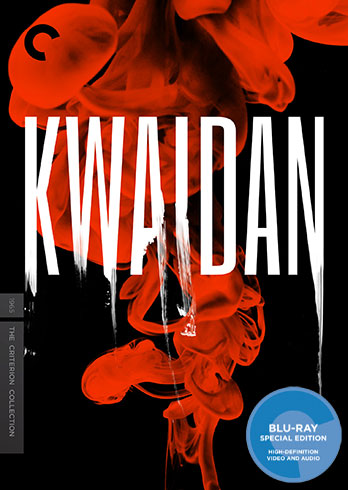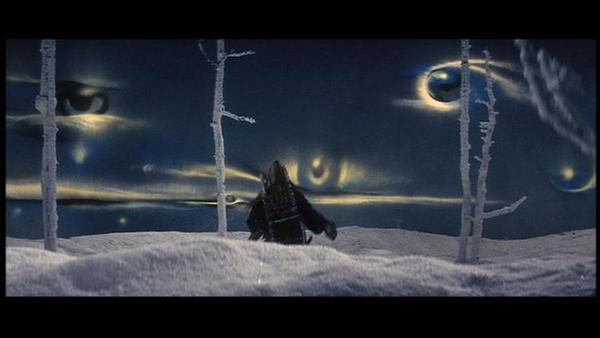Blu-ray Review: KWAIDAN, Sensational, Surreal Colors Of An Ancient Japanese World

From the opening moments of 1965's ghostly anthology Kwaidan, the viewer experiences a dissonant display of color and atmosphere matched only by its precisely sparse experimental musical score (courtesy of Takemitsu Toru).
Recounting four disparate yet separate classical ghost stories from Japan's rich history, Kwaidan marks a major stylistic shift for acclaimed filmmaker Kobayashi Masaki, the celebrated director of reality-based black and white dramas such as Harakiri (1962) and The Human Condition trilogy (1959-1961). At 183 minutes, the recovered original running time, not to be confused with truncated versions that have circulated until recently, and massive in scope and budget, the deliberately paced -- but not boring -- film is nothing short of a truly epic and incredibly colorful undertaking. Vision, risk, and raw artistry abound.
Comprised of four individual tales adapted by the enigmatic (by design) Greek-turned-American-turned-Japanese journalist and author Lafcadio Hearn, Kobayashi's Kwaidan is noteworthy for, among many other reasons, its effort in reclaiming his country's ancient folklore. As detailed in one of the Blu-ray's enlightening bonus features, Hearn's published tales of supernatural old world Japan, circa 1900, although "exoticized" for a Western audience, proved vastly popular in their rapidly industrializing home country of the day. So, with this major motion picture -- the largest Japanese production of its day -- the original tales come full circle; from ancient Japan to America and back to Japan.
As a full experience, the film is nothing short of an uneasy dreamlike rabbit hole into a storybook hallucination of traumatized samurai and mysterious spectral women. The backgrounds are enormous, hand-painted backdrops, effectively playing up and embracing the artiface enforced by filming such a nature-centric production inside of an airplane hangar. The skies are intense barrages of color, mists, and disembodied eyeballs.
It's no coincidence that the term "uncanny" is frequently used in the bonus features to describe the effect of Kwaidan. It must be said, however, that although always visually sumptous, the drone of the avant garde soundtrack and general stillness ("Kubrickian" before Kubrick had coined his style) of it all might warrant a good helping of caffeine for some viewers.
The four stories -- the eerie "The Black Hair," the tragic "The Woman of the Snow," the spectacular centerpiece "Hoichi the Earless," and the intentionally open-ended "In a Cup of Tea" -- do not intertwine in a way that contemporary audiences may anticipate. Characters from one tale do not show up in another, and there are no key items passed from story to story. There isn't even a tossed-off shared moment at an intersection. Clearly, Kobayashi wasn't interested in crafting a "shared universe" or laying groundwork for some sort of expandable world to be expounded upon in future installments. No, any connectivity here is purely aesthetic and latently thematic.

The Criterion Blu-ray is tremendous on all fronts. A long-in-coming reissue of their Kwaidan DVD that was originally released circa 2000, the Blu-ray boasts a satisfying but not overwhelming array of informative bonus features where there previously were none.
The bonus features include a lively and engaging audio commentary by film historian Stephen Prince; a short excerpt of a television interview with Kobayashi from his later years, as conducted by Shinoda Masahiro; a very informative first-hand remembrance of the making of Kwaidan with the assistant director Ogasawara Kiyoshi; and the afore-mentioned piece on the writer Lafcadio Hearn, an interview that might benefit the viewer by watching prior to the film, as it richly contextualizes the roots of the stories themselves.
More essentially, the film has undergone a 2K digital upgrade worthy of comparison to the finest transfers of vintage color films that the format has to offer, presenting Kobayashi's once-lost, preferred 183 minute, full-length cut of the film. In terms of replicating sensational, surreal color and detail of an ancient Japanese world, Criterion's Kwaidan Blu-ray takes an honored seat alongside their amazing release of Kinugasa Teinosuke's Gate of Hell, another essential work of Japanese cinema hailing from an earlier phase of the golden era of World Cinema.
As always, Criterion's commitment to high-end presentation and an approachable, educational presentation of film history is greatly evident. Having never experienced Kwaidan before, this disc proved revelatory. Those who opt to add this restored treasure of Japanese cinema to their own Blu-ray library will not be sorry.
(The images shown here are not necessarily reflective of the Blu-ray's picture quality.)
Kwaidan
Director(s)
- Masaki Kobayashi
Writer(s)
- Yôko Mizuki (screenplay)
- Lafcadio Hearn (novel)
Cast
- Michiyo Aratama
- Misako Watanabe
- Rentarô Mikuni
- Kenjirô Ishiyama

Do you feel this content is inappropriate or infringes upon your rights? Click here to report it, or see our DMCA policy.







